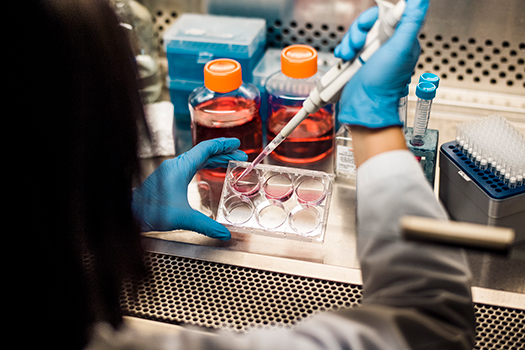Request Information on Clinical Trials
If you were diagnosed with a brain tumor we may have a clinical trial for you.
As part of your personalized treatment plan, you may receive chemotherapy alone or in conjunction with other treatments, such as surgery or radiation therapy. At Hermelin Brain Tumor Center, we employ novel techniques with delivery methods designed to minimize toxicity and chemotherapy side effects. We also offer targeted therapy and clinical trials for immunotherapy.
Learn more about our tailored approach to brain tumor treatment.
Brain cancer chemotherapy uses powerful drugs to target malignant tumors in the brain. All brain tumor chemotherapy has the same goal — to destroy tumors by disrupting specific cell mechanisms that control tumor growth or cell multiplication.
Chemotherapy drugs:
If you were diagnosed with a brain tumor we may have a clinical trial for you.

There are a number of drugs used for brain cancer chemotherapy, including:
In addition, our brain tumor specialists participate in ongoing brain cancer clinical trials that explore the effectiveness of specific chemotherapy drugs
At Hermelin Brain Tumor Center, each brain tumor undergoes a special analysis called brain tumor typing. This genetic and pathological testing of the tumor in your brain allows us to find the right treatment for you.
One example is Temodar (temozolomide), a chemotherapy drug used to treat glioblastoma (GBM) but only effective 40 percent of the time. Given GBM’s aggressiveness, there’s no time for a trial-and-error approach to determine if it’s working or not.
Instead, our team looks at the connection to a gene feature called MGMT (O(6)-methylguanine-DNA methyltransferase) as a way to predict who will respond:
With any cancer treatment, there is the potential for side effects, which can vary depending on the type of therapies you receive.
Your team will review your treatment plan with you and discuss possible side effects before chemotherapy begins. That way, you can make informed decisions about your care. We also provide a full range of brain tumor support to maintain your quality of life.
While everyone responds differently, some common chemotherapy side effects include:
In addition, people undergoing brain tumor chemotherapy have noticed issues with concentration and memory, sometimes collectively called “chemo brain.” Depending on the person, it may be temporary or last for years, seriously affecting quality of life.
Chemo brain is still poorly understood, and the name itself may not be accurate, given that other factors — the tumor itself, other medical conditions, etc. — can cause cognitive issues. We work with neuro-psychologists to assess cognitive challenges and create an individualized plan to increase memory and focus.
Targeted cancer therapies block the growth and spread of cancer by interfering with specific molecules involved in tumor growth and progression. By focusing on molecular and cellular changes specific to cancer, targeted cancer therapies may be more effective than other treatments and less harmful to normal cells.
Targeted therapies are being studied for use alone, in combination with other targeted therapies, and in combination with other brain cancer treatments such as chemotherapy. Targeted therapies of various kinds can:
Some drugs are used to stimulate a patient's immune system to attack cancer cells. Immunotherapy drugs are currently only used for brain tumors as part of brain cancer clinical trials.
We use cookies to improve your website experience. By using this site, you agree to our Terms of Use. Read our Internet Privacy Statement to learn what information we collect and how we use it.